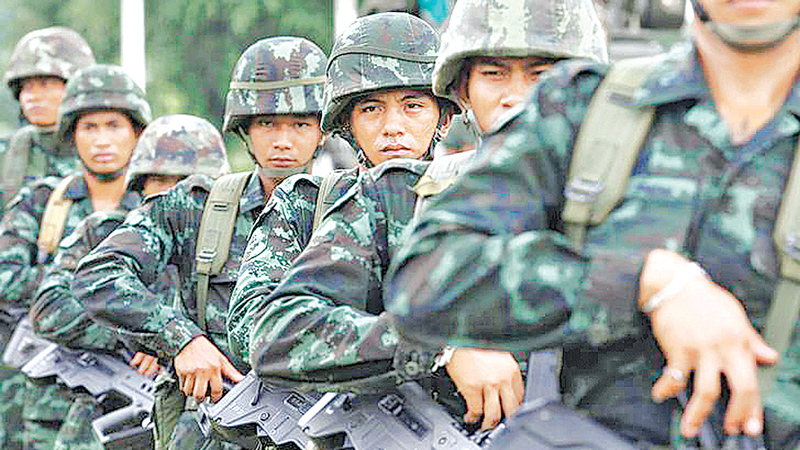Under the cover of darkness, Thai soldiers and paramilitary troops are raiding remote stretches of Thailand’s southernmost provinces to arrest suspected Malay-Muslim insurgents.
In January, hundreds of armed troops combed through Bannang Sata, a hilly area of forest and rubber plantations near the Malaysian border, where militants have staged attacks in an insurgency entering its 15th year. Soldiers have arrested more than 40 men during two forays here.
The sweep is the military’s response to a rebel attack weeks earlier, when 10 armed insurgents, dressed in camouflage, stopped a double-decker tour bus travelling along a desolate road in Bannang Sata. The rebels ordered the driver and passengers to step out of the bus and then set it on fire, although no one was injured. The arrested rebels are wanted for the bus attack.
“Soldiers came at about 3 a.m. to our house and took away my son,” said one mother, wrapped in a loose black robe from head to toe.
But there is another sense of urgency in the military’s sweep across Narathiwat, Pattani and Yala, the provinces where the Barisan Revolusi Nasional, or BRN, the largest and best-armed militant force in the region, is waging a separatist rebellion. The BRN is a shadowy group that remains largely hidden, and members do not reveal themselves as militants in public.
Thailand’s ruling military junta, led by Prime Minister Prayuth Chan-ocha, has endorsed a counter-insurgency strategy to achieve a security deadline: to end the long-running conflict by 2018, the first target in a seven-point blueprint.
Tourist resorts
The junta has an economic reason for this rush, too. Meeting the security goal would bring relief in the tourist industry, which contributes 20% of the country’s gross domestic product. Popular resort areas, such as Phuket, are on the fringes of the fighting. And in recent years, the BRN has made selective strikes in tourist resorts beyond the troubled provinces.
To forge ahead, the military, which has 60,000 soldiers on the ground, has deployed its 15th infantry regiment in the vanguard. It is assisted by paramilitary ranger units on the frontlines.
“The rangers operate as smaller units and are more mobile and flexible than the regular army, which moves as a company,” said Don Pathan, an independent security analyst based in Yala. “They have helped the army to expand its security grid to remote areas.”
That has led to a burst of positive news for the junta, as the counter-insurgency strategy to disrupt the BRN’s operating terrain reaps results.
According to Deep South Watch, an independent organisation monitoring the conflict, the insurgency-related death toll of 235 people last year was the lowest since the current cycle of violence began after militants stormed a military camp in January 2004. The highest number of deaths occurred in 2007, with 892.
The decline in deaths has been a boost for Prayuth and the junta, who are playing up the latest turn in the 14-year conflict, in which nearly 7,000 people have been killed and more than 12,500 have been injured.
Last Friday, the military staged a public-relations event with platoons of Malay-Muslim men -- who the military said were ex-militants that had been arrested and rehabilitated -- line up in a ceremonial handing-over of weapons in a military camp.
Counter-insurgency strategy
But the counter-insurgency strategy is stoking anger in rural enclaves, home to Malay-Muslims -- the largest minority in predominantly Buddhist Thailand. Villagers in Sai Buri and Nong Chik, in Pattani Province, are suffering under the nighttime raids by troops. They have been in the military’s crosshairs after the BRN’s tit-for-tat strikes, in which paramilitary troops on patrol have been killed in ambushes. In one instance, the military encircled one village in Nong Chik after midnight in late January and arrested 18 men. Meanwhile, in Sai Buri, 10 men were nabbed in the same month.
“They were taken because of a bombing near our village,” said Noorisan Maseng, a mother of two in Nong Chik, whose husband has been detained at a military camp in Pattani. - Nikkei Asian Review



Add new comment